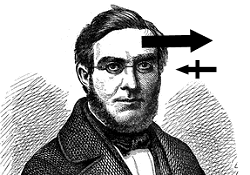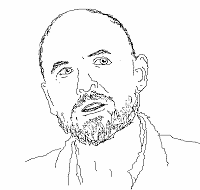 In the course of this review of Carlo Rovelli’s Seven Brief Lessons on Physics, Alva Noë asks a fascinating question: does it make any sense to imagine that one might think backward?
In the course of this review of Carlo Rovelli’s Seven Brief Lessons on Physics, Alva Noë asks a fascinating question: does it make any sense to imagine that one might think backward?
In physics we are accustomed to thinking that entropy always increases; things run down, spread out, differences are evened out and available energy always decreases. Are cognitive processes like that, always going in one underlying direction? Are they like a river which flows to the sea, or are they more like a path we can take in either direction?
Well, we can’t talk backwards without careful preparation, and some kinds of conscious thought resemble talking to oneself. In fact, we can’t perform most tasks backwards without rehearsal. Unless one takes the trouble to learn zedabetical order, we cannot easily recite our letters in reverse. So it doesn’t seem we can do that kind of backward thinking, at least. We can, of course, read a written sentence in the reverse word order and I suppose that in that sense we can think the same sentence backwards, or ‘backwards sentence same the think’; but we might well doubt whether that truly reverses the thought.
On the other hand, on another level, there seems to be no inherent direction to a chain of thought. If I think of an egg, it makes me think of breakfast, and breakfast makes me think of getting up; but thinking about getting up might equally have prompted thoughts of breakfast, which in turn might have brought an egg to mind. The association of ideas goes both ways. Logical thought needs a little more care. ‘If p then q’ does not allow us to conclude that if q then p – but we can say that not-q gives us not-p. With due attention to the details there doesn’t seem to be a built-in direction to deduction.
The universal presence of memory in all our thoughts seems a deal-breaker on reversibility, though. We cannot forget things at will; memories constantly accumulate; and we cannot deliberately unthink a thought in such a way as to erase it from recollection. This one-way effect seems to be equally true of certain kinds of thought on another level. We have, let’s say, a problem in mind; all the clues we need are known. At some point they come together to point to the right conclusion – Aha! Unless we find a flaw in our reasoning, the meshing of the clues cannot be unpicked. We can’t ununderstand; the process of comprehension seems as irrevocable as the breaking of an eggshell or the cooking of a omelette.
There’s an odd thing about it though. The breaking of the egg is an example of the wider principle of entropy; the shell is destroyed, and later the protein is denatured by heat. The solving of the problem, by contrast, is constructive; we’re left with more than we had before and our mental contents are better structured, not worse. Learning and understanding seems like a process of growth. Like the growth of a plant it is of course just a local reversal of entropy, which has to be paid for through the use of a lot of irretrievable energy; still, it’s remarkable (as is the growth of a plant, after all).
Hang on, though. Isn’t it the case that we might have been entertaining a dozen different ideas about the possible solution to our problem? Once we have the answer those other hypotheses are dropped and indeed may even be truly forgotten. More than that, the right answer may let us simplify our ideas, the way Copernicus let us do away with epicycles and all the rest of the Ptolemaic system nobody has to think about any more. Occam tells us to minimise the number of angels we require for our theory, so isn’t the growth of understanding sometimes a synthesis which actually has the character of a reductive simplification? That isn’t usually a reversal as such, but doesn’t it involve in some sense the unthinking of certain thoughts? David Lodge somewhere has a character feel a pang of pity for all the Marxist professors in the universities of no-longer-communist countries who must presumably unspool years of patient theoretical exegesis in order to start understanding the world again.
Well, yes, but I don’t think that is truly an unthinking or reverse cogitation. Is it perhaps more like a plant managing to grow downwards? So no, as Noë implied in the first place, it doesn’t really make sense to imagine we might think backward.


 There have been a number of attempts recently to externalise consciousness, or at least extend it beyond the skull. In Out of Our Heads, Alva Noë launches a very broad-based attack on the idea that it’s all about the brain, drawing in a wide range of interesting research – mostly relatively well-known stuff, but expounded in a style that is clear and very readable. Unfortunately I don’t find the arguments at all convincing; I’m not unsympathetic to extended-mind ideas, but Noë’s clear and thorough treatment tended if anything to remind me of reasons why the assumption that consciousness happens in the brain looks so attractive.
There have been a number of attempts recently to externalise consciousness, or at least extend it beyond the skull. In Out of Our Heads, Alva Noë launches a very broad-based attack on the idea that it’s all about the brain, drawing in a wide range of interesting research – mostly relatively well-known stuff, but expounded in a style that is clear and very readable. Unfortunately I don’t find the arguments at all convincing; I’m not unsympathetic to extended-mind ideas, but Noë’s clear and thorough treatment tended if anything to remind me of reasons why the assumption that consciousness happens in the brain looks so attractive.